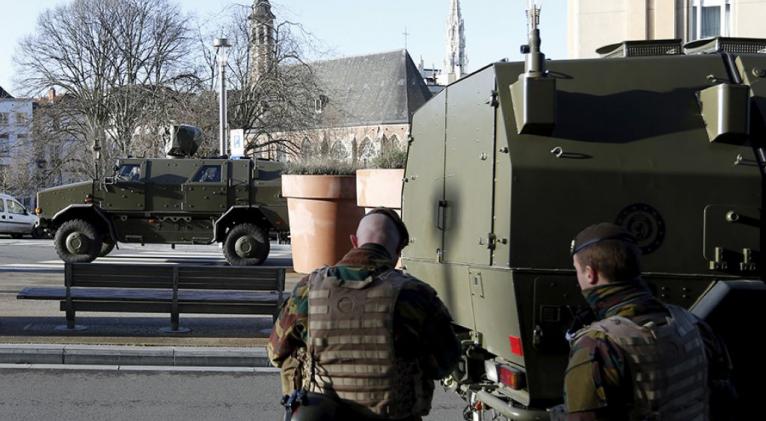Brussels terror attacks follow months of tension & uncertainty in Belgian capital
especiales

While Belgium’s migration minister, Theo Francken, claimed “We got him,” Foreign Minister Didier Reynders said at a German Marshall Fund forum that Abdeslam was “ready to start something from Brussels.” Police found a number of heavy weapons, and they also believed that a new network of terrorists was developing around him.
Reynders added that while searching for 10 possible accomplices in the Paris attacks, Belgian authorities discovered more than 30 people of interest to the investigation. The FM said that EU-wide intelligence sharing helped track Abdeslam, as well as information from Turkey in particular.
However, Ricardo Baretzky, from the European Center for Information Policy, told RT that terrorist organizations are becoming extremely well organized and that terror attacks could become a regular feature in Europe, while mentioning this is a “kind of guerilla warfare.”
“Terrorist organizations over the last couple of years have shown a trend of retaliation. If we look back at all the attacks that have taken place in the European Union over the last two years, there was a certain period of retaliation over a certain period of time,” Baretzky said.
“The terrorist organizations are well organized, they are extremely dangerous and it is time that the public [understood] there is a risk factor involved in the public domain. If significant attention is not paid then I see a very dark future,” he added.
Ever since the Paris terror attacks in November, Brussels has been a city on edge after it emerged that those who took part in the assaults in the French capital were based in Belgium.
Just over a week after the Paris attacks, Brussels was placed on lockdown, with the authorities warning of a “serious and imminent” threat of a terrorist attack. This led to schools and the Metro being closed down, while a number of football matches were canceled across the country.
"The advice for the population is to avoid places where a lot of people come together, like shopping centers, concerts, events or public transport stations wherever possible," a spokesman for the government's crisis center said, Reuters reported.
In December, two people were arrested by the Belgian authorities on suspicion of plotting terrorist attacks in Brussels on New Year’s Eve. According to prosecutors, police found military clothing and Islamic State (IS, formerly ISIS/ISIL) propaganda material during the search of suspects’ homes. However, no weapons or explosives were found.
"Our investigation revealed serious threats of an attack on symbolic places in Brussels during the celebrations for New Year's Eve," Belgian prosecutors said in a statement.
@RT_com BREAKING: New Year’s Eve festivities cancelled in Brussels over terror threat - Mayor http://on.rt.com/70p0

The threats prompted Brussels Mayor Yvan Mayeur to cancel the city’s traditional New Year’s festivities. In 2014, around 100,000 people had attended a fireworks display in the Belgian capital.
The New Year’s celebrations passed largely without incident, though a group of youths could be heard shouting “Allahu Akbar” (meaning “God is great” in Arabic), as they set fire to a Christmas tree in the Anderlecht area of Brussels.
The Molenbeek area in central Brussels became infamous as a hotbed of radical Islam as it was from this district where some of the terrorists who carried out the Paris attacks were living before they carried out the attacks.
@RT_com Molenbeek mayor had ‘detailed list of Paris terrorists’ 1 month prior to #ParisAttacks http://on.rt.com/6xp8

It was also alleged that the mayor of the Molenbeek district, Francoise Schepmans, was given the names and addresses of over 80 suspected militants based on information from Belgium’s security services, including both the mastermind of the Paris attacks, Abdelhamid Abaaoud, and the two brothers, Salah and Brahim Abdeslam, who participated in the November 13 attacks. However, she failed to act on the information.
Abaaoud was a Molenbeek resident who had left to fight alongside Islamic State in the Syrian jihad in early 2014. He was killed in a police raid last week in Saint-Denis, Paris, after taking the lives of 130 people in the attacks in the French capital.
Following the attacks in Paris, Belgian Interior Minister Jan Jambon said it is time for the government to take the necessary steps to tackle the problems of jihadism and radicalization in the area, while adding that they would check “every address in Molenbeek.”
"It is unacceptable that we do not know who is living in this area," he said in an interview with the Het Nieuwsblad newspaper. "There are two people registered in some apartments, but actually 10 living there.”
Jambon also called for door-to-door searches to take place.
“The local authorities must go from door-to-door, ring the bell and ask who actually lives there. An address should be checked by a police officer when a person goes to live at a new abode,” the interior minister added.














Add new comment